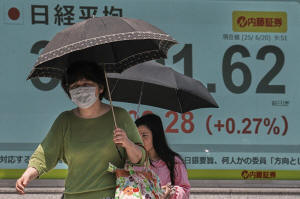Shares and oil prices gain as the world waits to see if US will join
Israel's war against Iran
[June 20, 2025] By
TERESA CEROJANO
MANILA, Philippines (AP) — World shares are mostly higher and crude oil
prices have rebounded as investors wait to see if the U.S. will join
Israel’s war against Iran.
Britain's FTSE 100 was 0.4% higher at 8,829.82 and the CAC-40 in Paris
gained 0.6% to 7,595.06. Germany's DAX rose 0.9% at 23,256.98.
U.S. futures edged lower after Wall Street was closed on Thursday for
the Juneteenth holiday, with contracts for the S&P 500 and the Dow Jones
Industrial Average down 0.2%.
U.S. benchmark crude oil gained 52 cents to $75.66 per barrel, while
Brent crude, the international standard added 31 cents to $77.01 per
barrel.
Oil prices have been gyrating as fears rise and ebb that the conflict
between Israel and Iran could disrupt the global flow of crude. Iran is
a major producer of oil and also sits on the narrow Strait of Hormuz,
through which much of the world’s crude passes.
Investors remained wary after the White House said President Donald
Trump could decide on whether to launch an attack on Israel within the
next two weeks, but that he “still believes diplomacy is an option,”
said Anderson Alves, a trader at ActivTrades.

“The stock market’s risk premium isn’t just rising — it’s recalibrating
for a world where every macro lever now doubles as a tripwire,” Stephen
Innes of SPI Asset Management said in a commentary, adding that traders
are bracing for what comes next.
“A delayed fuse is still a fuse,” he said.
Trump's tariffs agenda may have been eclipsed by the conflict in the
Middle East, but it remains another major factor weighing on markets.
[to top of second column] |

People walk in front of an electronic stock board showing Japan's
Nikkei index at a securities firm Friday, June 20, 2025, in Tokyo.
(AP Photo/Eugene Hoshiko)
 Tokyo's Nikkei 225 index edged 0.2%
lower to 38,403.23 after Japan reported that its core inflation
rate, excluding volatile food prices, rose to 3.7% in May, adding to
challenges for Prime Minister Shigeru Ishiba’s government and the
central bank.
“Core Japanese inflation rose more than expected in May. Even so,
the Bank of Japan is likely to prioritize the negative impact of
U.S. tariffs, Min Joo Kang of ING Economics said in a commentary.
”For now, it’s more concerned about the risk that US trade policies
could break the virtuous circle of wage growth and inflation."
Hong Kong’s Hang Seng index climbed to 1.3% to 23,530.48, while the
Shanghai Composite fell 0.2% to 3,359.90. China's central bank kept
its key 1-year and 5-year loan prime rates unchanged, as expected.
Australia’s S&P/ASX 200 shed 0.2% to 8,505.50, while South Korea’s
Kospi gained 1.5% to 3,021.84.
On Thursday, the Bank of England kept its main interest rate at a
two-year low of 4.25%, citing risks that the conflict between Israel
and Iran will escalate.
The U.S. dollar slipped to 145.37 Japanese yen from 145.46 yen. The
euro rose to $1.1516 from $1.1498.
All contents © copyright 2025 Associated Press. All rights reserved |